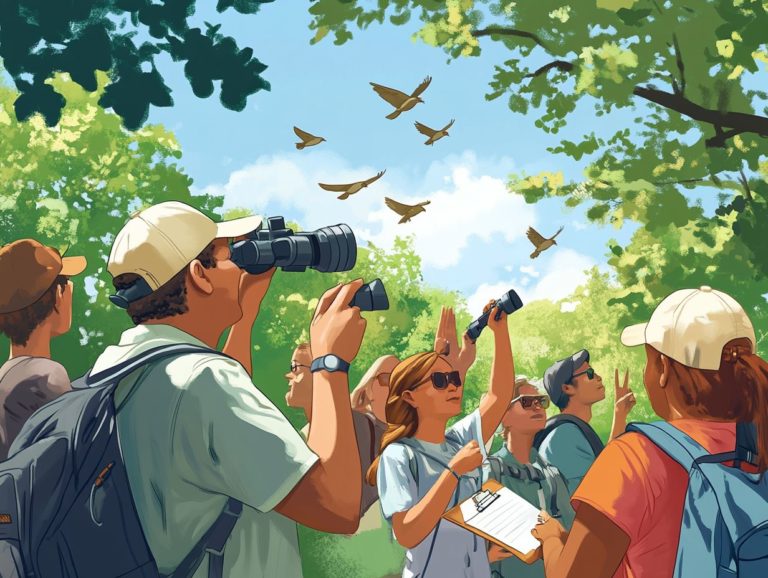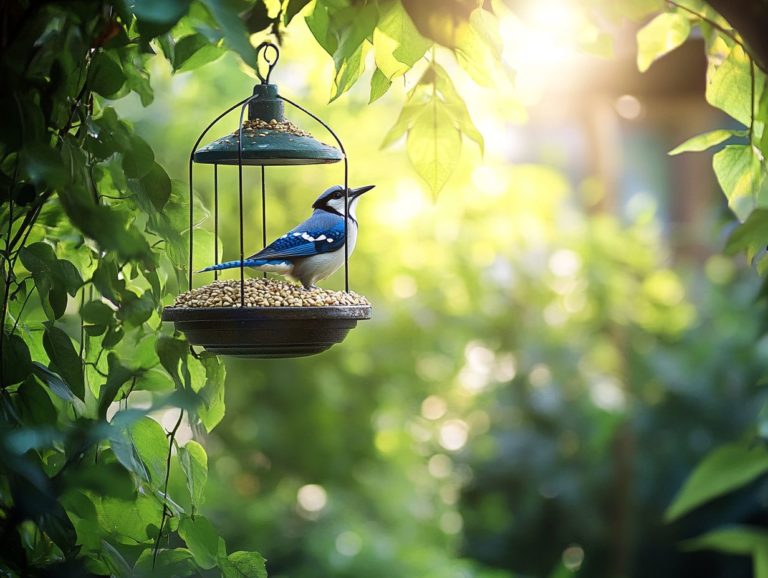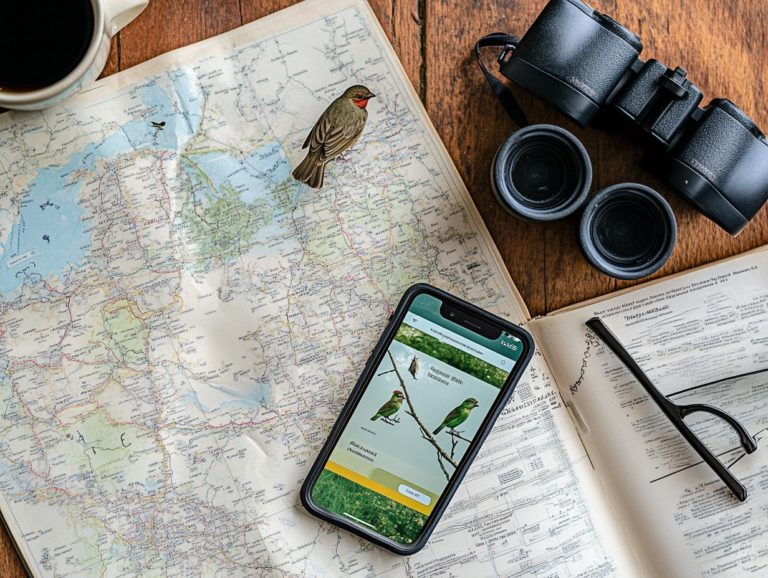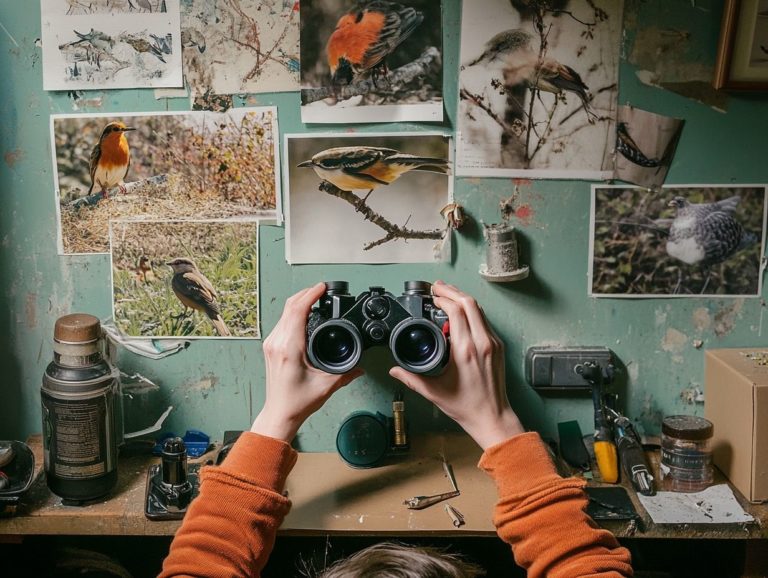Do I Need a Permit for Bird Watching?
Birdwatching is a delightful hobby that immerses you in the beauty of nature, but you may find that a birdwatching permit is required in certain situations, especially when engaging in outdoor recreation activities.
Understanding when and why you might need one is crucial for responsible birding. Let s dive into the world of birdwatching permits, highlighting the conservation benefits they support, including habitat conservation for migratory birds, and the exclusive access they provide to restricted areas.
You ll explore the various types of permits available, including special use permits, how to obtain them, and the guidelines that ensure respectful observation of wildlife. If permits aren t your thing, don t worry there are alternative ways you can support bird conservation efforts.
Dive in to discover everything you need to know about birdwatching permits and enhance your outdoor adventures!
Contents
- Key Takeaways:
- Reasons for Obtaining a Permit
- Types of Bird Watching Permits
- How to Obtain a Bird Watching Permit
- Permit Regulations and Restrictions
- Alternatives to Obtaining a Permit
- Frequently Asked Questions
- Do I Need a Permit for Bird Watching?
- What type of bird watching requires a permit?
- Do I need a permit for bird watching in a public park?
- Can I get a permit to bird watch in a protected area?
- Do I need a permit if I am only watching birds for personal enjoyment?
- What happens if I bird watch without a permit in a restricted area?
Key Takeaways:
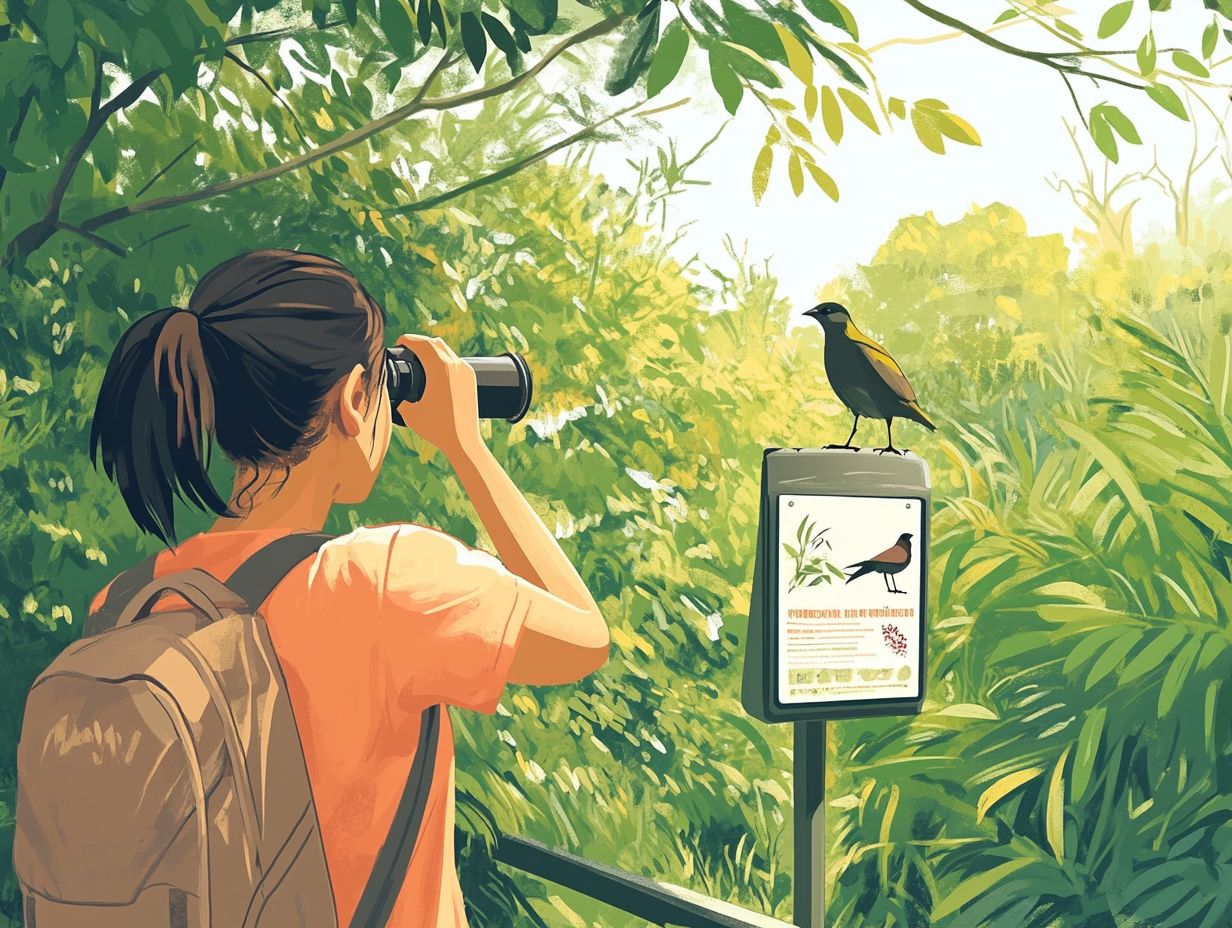
- A birdwatching permit is required for certain areas to protect and conserve bird species and their habitats.
- Permits can also provide access to restricted areas and opportunities to support bird conservation efforts.
- There are different types of permits, including national, state, and private landowner permits, with varying application processes and regulations.
What is a Birdwatching Permit?
A birdwatching permit is your ticket to legally observe and study migratory birds and participate in activities like using trained birds to hunt in designated areas, all while helping to protect various bird species and promote wildlife conservation. These permits are governed by federal regulations, including the Migratory Bird Treaty Act, and are typically issued by organizations like the U.S. Fish and Wildlife Service, which is dedicated to maintaining healthy bird populations and their habitats.
By acquiring this permit, you’re not just ensuring compliance with the Migratory Bird Treaty Act designed to shield migratory bird species from overexploitation and habitat loss but also playing a critical role in taking care of the environment. These permits regulate birdwatching activities, enabling effective population management and facilitating essential data collection and research to monitor species health.
When observers adhere to established guidelines, they help minimize negative impacts on local ecosystems and foster sustainable practices among wildlife enthusiasts.
In essence, these permits act as a bridge between your appreciation of nature and the imperative for responsible wildlife management.
Reasons for Obtaining a Permit
Securing a birdwatching permit is crucial for multiple reasons. It plays a significant role in the conservation and protection of wildlife. It also grants you access to restricted areas such as national wildlife refuges.
Additionally, it encourages public engagement in taking care of the environment. With these permits, you can actively contribute to wildlife conservation efforts, aligning your activities with established conservation plans designed to sustain healthy bird populations, including those of the bald eagle and golden eagle, and minimize environmental impact.
Explore your local birdwatching opportunities and obtain permits where necessary!
Conservation and Protection of Birds
The conservation and protection of migratory birds are crucial elements of wildlife preservation, particularly for endangered species like the bald eagle and golden eagle. This necessitates tailored management strategies for their thriving, including specific provisions under the Bald and Golden Eagle Protection Act.
Through meticulously crafted conservation plans, bird-watching permits and special events support the efforts to protect habitats and aid in the recovery of these avian populations.
These permits help regulate wildlife observation. They also provide funding for habitat conservation initiatives, ensuring compliance with environmental laws aimed at preserving the breeding and migration routes of these magnificent birds. By engaging local communities in responsible bird-watching activities, you help raise awareness about the ecological significance of protected species.
Conservation strategies often involve habitat restoration projects that create safe environments for eagles and other migratory birds, ensuring their survival in the face of changing ecosystems. Collaborative efforts between conservation organizations and wildlife enthusiasts support programs like the Birding Access Program. This plays a vital role in enhancing these protection measures, ultimately leading to healthier bird populations and enriched biodiversity.
Access to Restricted Areas
Access to restricted areas, such as national wildlife refuges and special use permits, is one of the most significant perks of obtaining bird-watching permits. It allows you to explore habitats that would otherwise remain off-limits to the public, including zones designated for agricultural activities and fishing tournaments.
These permits ensure that your outdoor adventures are managed responsibly, aligning with conservation goals while providing you with recreational opportunities as an avid birder.
For example, specific wetlands and coastal zones are often designated as protected areas, offering you unique chances to observe rare or migrating species in their natural habitats. By granting access through permits, these restricted zones become vital spaces for education and research, encouraging you to engage more deeply with the surrounding ecosystem.
The fees collected from these permits play a direct role in supporting habitat restoration projects and conservation efforts, striking a sustainable balance between enjoying nature and protecting it for future generations. By doing this, responsible birders like you enhance your experiences and contribute positively to the preservation of these invaluable resources.
Types of Bird Watching Permits
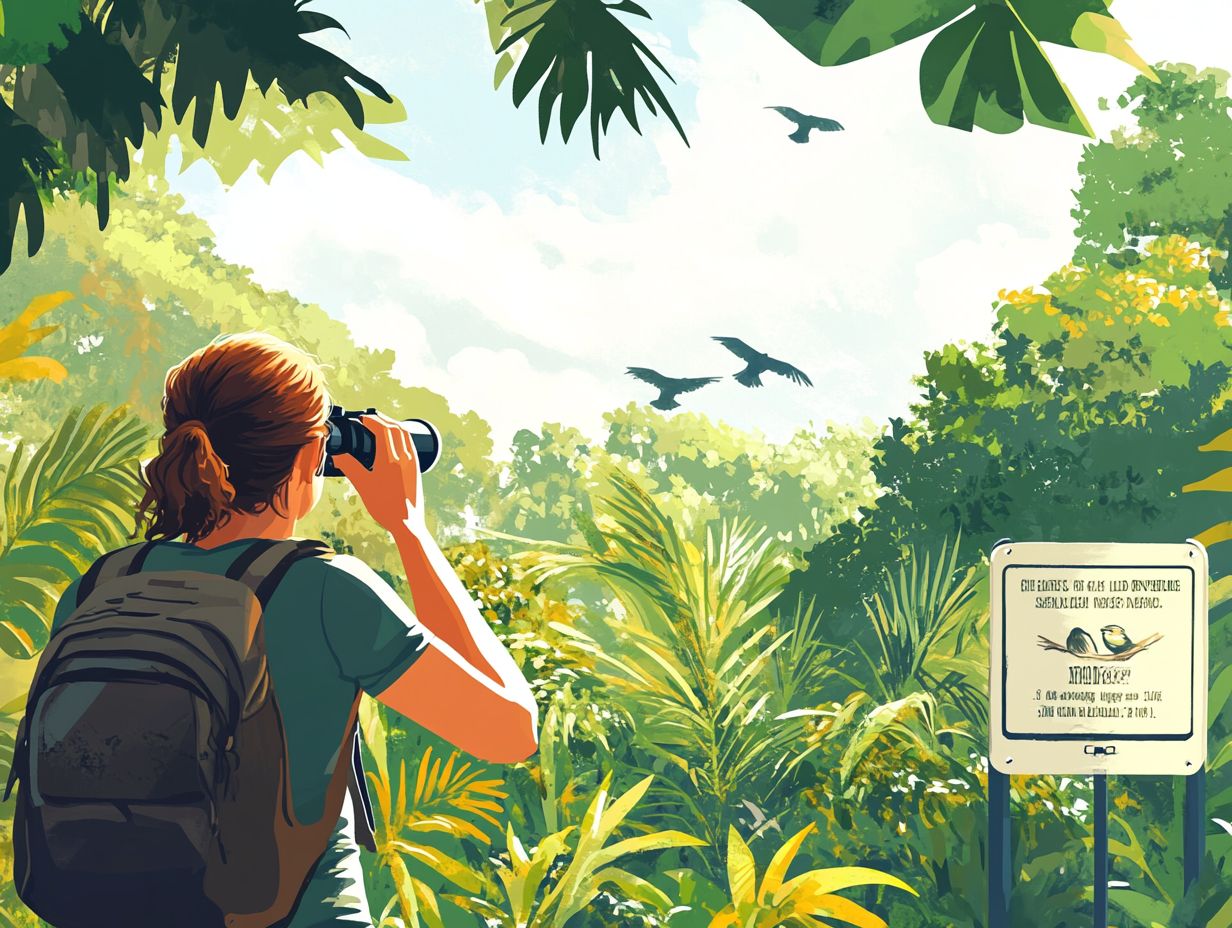
Bird watching permits come in a variety of forms, including national and state permits that grant access to public lands and wildlife refuges, as well as private landowner permits tailored for specific properties.
Grasping the nuances between these permit types, including special use permits, is essential for birders like you who want to ensure compliance with wildlife-related regulations.
National and State Permits
National and state permits are essential for you as a bird watcher, aligning your passion with the missions of wildlife service agencies and ensuring compliance with the Migratory Bird Treaty Act, a law that protects migratory birds, and the Bald and Golden Eagle Protection Act, along with other environmental laws.
By obtaining these permits, you not only stay on the right side of the law but also play a vital role in broader conservation efforts aimed at sustaining bird populations and their critical habitats. These permits often grant you access to exclusive birding sites and events, including educational activities and recreational service opportunities, fostering a stronger community among fellow enthusiasts.
This blend of legal compliance and active engagement, particularly in monitoring activities, bolsters educational initiatives, raising awareness about the ecological importance of avian species.
Ultimately, you and the wildlife conservation efforts benefit mutually, steering your endeavors toward a more harmonious relationship with nature.
Private Landowner Permits
Private landowner permits grant you access to specific properties, providing fantastic chances to observe diverse bird species, including those in declining populations, in their natural habitats. This helps advance wildlife education and conservation goals.
These permits cultivate partnerships between landowners and the birding community, creating mutual benefits for everyone involved. By granting these permits, landowners effectively bridge the gap between their privately held lands and the public, allowing you to explore habitats that would otherwise remain untouched. This supports alternative revenue through ecotourism and encourages sustainable practices among landowners, aligning with broader conservation efforts.
Such teamwork often leads to educational programs and wildlife partnerships that emphasize the importance of biodiversity and promote responsible wildlife observation. By engaging in these partnerships, landowners can secure funding and support for habitat preservation and restoration, making a lasting impact on local ecosystems and contributing to the long-term survival of various bird species.
How to Obtain a Bird Watching Permit
Securing a bird watching permit requires navigating a detailed application process that may involve submitting specific forms, including permit applications. You must adhere to federal regulations, which are laws that the national government sets.
By familiarizing yourself with the necessary steps, you can effortlessly obtain the permissions required for your wildlife-related endeavors. This ensures that your activities are both effective and compliant with legal standards.
Application Process and Requirements
The application process for bird-watching permits can vary significantly depending on the type of permit you re seeking. Specific requirements are often dictated by the local wildlife service and the intended bird-watching activities.
- Start by visiting the relevant wildlife service s website, where you can find detailed guidelines tailored to your region.
- You ll typically need to provide proof of residency, identification, and a thorough description of your planned activities.
- It s wise to submit these documents well ahead of the peak bird-watching season, as processing times can stretch into several weeks.
Be mindful of any associated fees, which may differ based on the type of permit you pursue, especially for non-commercial activities. To bolster your chances of approval, keep yourself well-informed about compliance with watching birds and special use permits. Maintain open lines of communication with wildlife officials. This meticulous attention to detail will ensure that you adhere to all guidelines effectively.
Permit Regulations and Restrictions
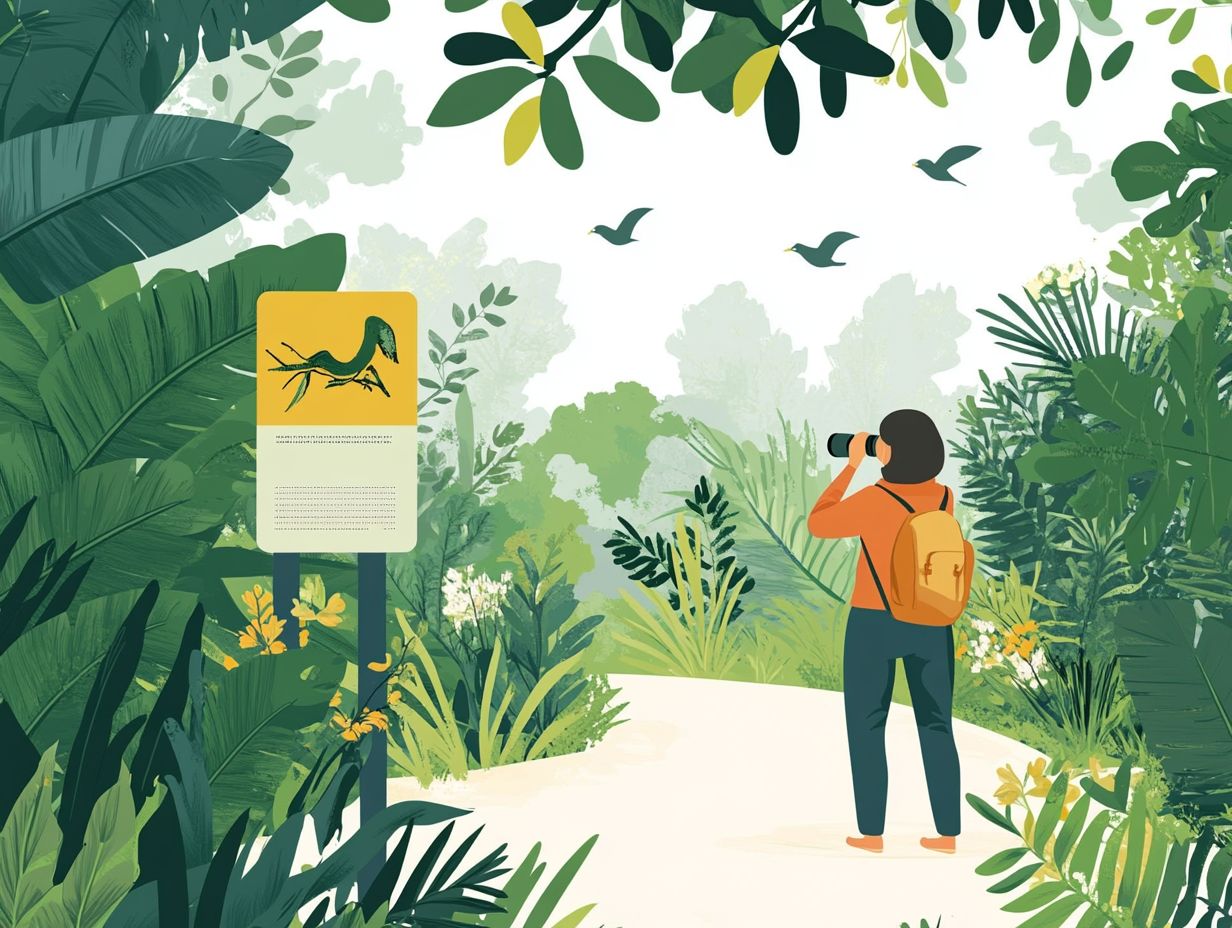
Bird watching permits come with a series of regulations and restrictions crafted to minimize environmental impact and safeguard wildlife habitats. This enables you to indulge in your passion responsibly while understanding these permit regulations is crucial for ensuring your compliance and positively contributing to conservation efforts.
Don t miss out on these exciting experiences! Apply for your permit today and start your bird-watching adventure!
Rules and Guidelines for Permit Holders
Rules and guidelines for permit holders are crafted to promote responsible bird-watching practices that align with wildlife conservation objectives and effective monitoring efforts. These guidelines consistently prioritize the protection of bird populations and their habitats, including those of bald eagles and golden eagles.
As a permit holder, you may need to follow specific distance regulations. These rules help minimize disturbances to nesting sites.
You might also be restricted from using certain equipment that could harm wildlife. Many permits include rules for reporting what you see, enabling authorities to monitor compliance and assess the health of bird populations.
This practice not only helps maintain ecological balance but also encourages ethical birding habits that lessen human impacts on fragile environments.
Following these rules means you re helping protect our precious birds!
Alternatives to Obtaining a Permit
Obtaining a bird watching permit is essential for certain activities, but there are plenty of alternatives for those who wish to support bird conservation without the need for formal permits, such as participating in wildlife education and community initiatives.
Engaging in activities that don t make money and participating in wildlife education initiatives allows you to enhance awareness and further conservation goals, making a meaningful impact without the red tape.
Other Ways to Support Bird Conservation
Supporting bird conservation goes far beyond just obtaining a permit; it encompasses a range of meaningful actions, such as participating in wildlife education programs, engaging in community initiatives, and joining projects that help improve and restore bird homes. These efforts nurture a deeper understanding of local bird populations and their needs within the ecosystem.
By attending local workshops, you can discover the crucial roles birds play in pollination and seed dispersal, enriching your appreciation for these remarkable creatures. Engaging in community clean-up efforts to reduce litter in parks and natural areas not only creates safer habitats for birds but also enhances the beauty of your surroundings.
Furthermore, supporting native plant gardens or participating in tree planting events beautifies neighborhoods while offering vital food and shelter for avian populations. By working together, you can make a big impact on conservation while strengthening your connection to the environment and to your community.
Frequently Asked Questions
Do I Need a Permit for Bird Watching?
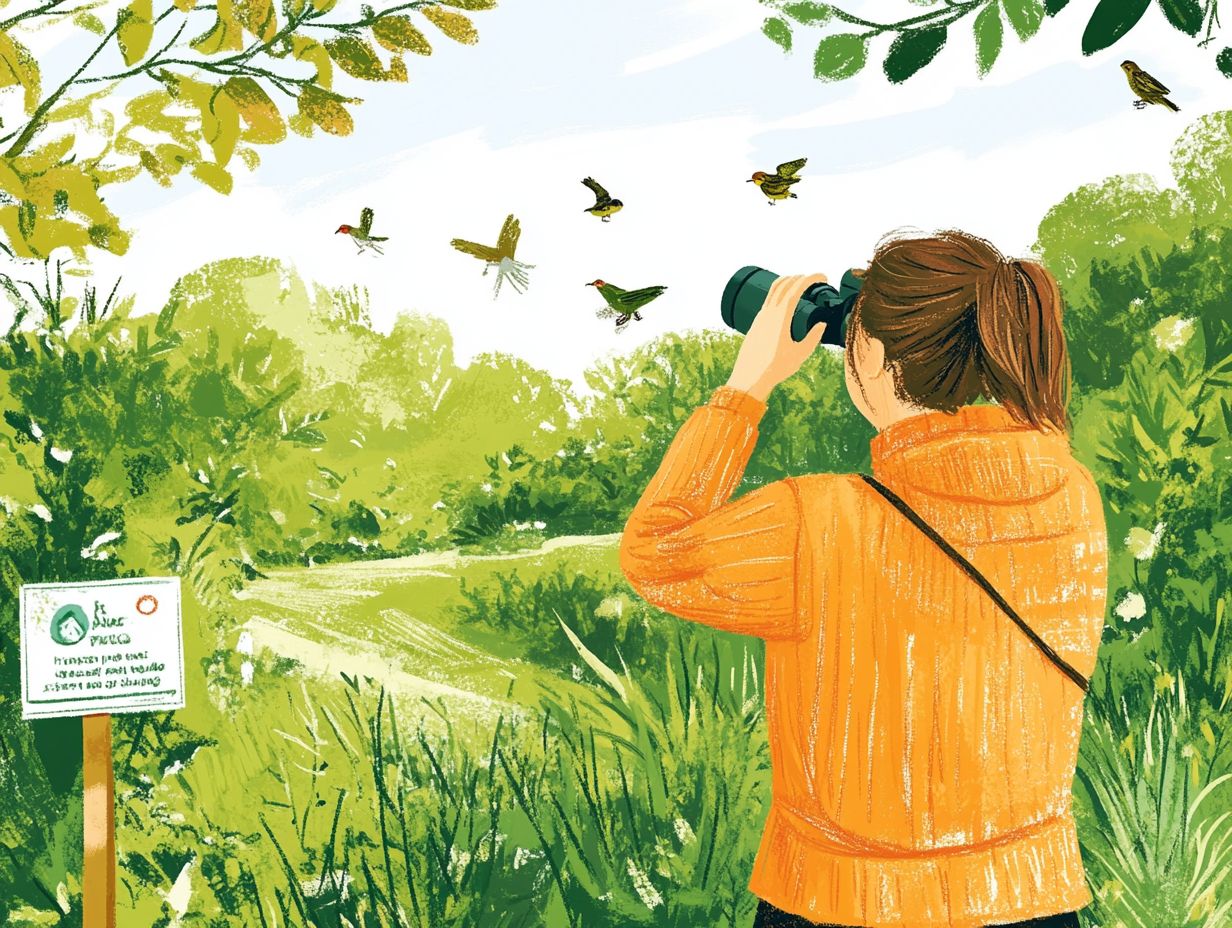
You may need a permit depending on where you want to bird watch. Some areas require a permit for certain activities, while others do not. It’s important to understand what you should know about bird watching laws to ensure compliance during your outings.
What type of bird watching requires a permit?
If you want to conduct scientific research, banding, or photograph birds for commercial activities, you will need a permit. Always check with local authorities or wildlife agencies for regulations.
Do I need a permit for bird watching in a public park?
Most public parks don t require a permit for bird watching unless you disturb the environment or harm the birds. Always check the park’s rules first.
Can I get a permit to bird watch in a protected area?
Yes, some protected areas do require a permit for bird watching. This helps protect the birds and their habitats, so be sure to get your permit before visiting!
Do I need a permit if I am only watching birds for personal enjoyment?
No permit is needed if you re just enjoying the birds for yourself. However, always respect their habitats while you watch.
What happens if I bird watch without a permit in a restricted area?
If caught bird watching without a permit in a restricted area, you could face fines. Follow the rules to protect our birds and their homes.


